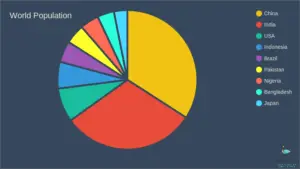
There are many reasons why English is such an important language in Africa. For one, English is the official language in many African countries, including Nigeria, Ghana, Kenya, and Uganda. This means that English is used in all official communications, including government documents and court proceedings.
In addition, English is the most commonly spoken language in Africa, with over 130 million people speaking it as a first or second language. This makes English a vital language for trade and commerce in Africa. English is also the language of education in many African countries, which means that it is essential for students who want to study at universities or colleges in Africa.
Finally, English is a popular language for music, television, and film in Africa. This means that it is a great way to connect with African culture and to learn about the diverse experiences of people from all over the continent.
Contents
English In Africa
English is an important language in Africa because it is the official language in many countries and is used as a lingua franca to communicate between different groups and languages. In addition, English has become a major language in business and education, making it an important tool for economic development. English is also used in the media and in literature. Furthermore, the internet has helped spread English in Africa and it has become a more important language, especially in urban areas. As a result, English has become an essential language for communication and participation in the African continent.
History of English in Africa
The history of English in Africa is a complex and fascinating one. It is rooted in the colonial period of the continent, but its presence has only grown and become more significant in recent years. English is currently the most widely spoken language in Africa, used in a variety of contexts across the continent.
The presence of English in Africa began with the colonial period when European nations established trading posts and eventually colonies across the continent. During this period, English was the primary language of communication between the colonizers and the colonized and thus became a lingua franca of sorts. As a result, many African countries adopted English as an official language upon gaining their independence.
Today, English is the primary language of communication for many Africans, both in their personal and professional lives. It is used in education, business, and media; and it is increasingly becoming the language of choice for many Africans when communicating with the outside world.
The spread of English in Africa has been further aided by the growth of technology and the internet. English is the primary language of many websites, social media platforms, and other digital services, making it more accessible to a greater number of people.
Furthermore, English is increasingly becoming the language of choice for international relations and business dealings. Many African companies and organizations now conduct their business in English, making it easier to do business with other countries and regions.
The history of English in Africa is a complex and multifaceted one, and its presence continues to grow and evolve. As the language continues to find its place in the continent, its importance to African culture and society will only become more significant.
Role of English in African countries today

The role of English in African countries today is both complex and varied. English is widely seen as a language of global communication and an important tool for economic and political advancement, and it is increasingly becoming the language of choice for many African countries.
As a result, English has become a common language across many African countries. English is used in government, business, education, and the media, allowing African countries to engage in international communication and collaboration. It is also used as a language of instruction in many schools and universities, allowing those who are educated in English to access a range of educational opportunities.
However, the increasing use of English in African countries has also led to some concerns. Some commentators have argued that it has led to the erosion of indigenous languages and cultures, putting them at risk of extinction. Others have argued that English is being used as a tool of exclusion, allowing those with access to English to dominate the discourse and control resources.
At the same time, English has also provided opportunities for African countries. It has enabled African countries to engage with the global market and to access the latest developments in technology and science. It has also allowed African countries to develop their own unique voices in the global arena, enabling them to participate in international debates and discussions.
Overall, the role of English in African countries today is complex and multi-faceted. It is a language that has enabled African countries to engage with the world, but it has also been used as a tool of exclusion. Despite these challenges, English remains an important language for African countries and is an important part of their cultural and linguistic heritage.
Benefits of English in African countries
English is widely spoken in many African countries and has become an integral part of the African culture. English is the official language in many African countries and is widely used in business, education, government, and media. As a result, English has become a powerful tool for Africans to communicate, both within the continent and beyond.
Learning English can open up a world of opportunities for African people. English is the language of global communication and is spoken by more than 1.5 billion people worldwide. Knowing English can help African people communicate with others from different countries, allowing them to share ideas and build relationships. English is also the language of business, and having a good command of it can help African people find jobs, especially in the international market.
English also serves as a bridge between cultures. The ability to understand and speak English has allowed Africans to interact with people from different parts of the world, learn different cultures and build a greater understanding of the global community. This can open up new opportunities for African people to explore the world and build connections with people from different backgrounds.
English is also an important tool for education. In Africa, English is taught in many schools and universities, and is often the language of instruction. Knowing English helps African students become more competitive and better prepared for higher education. English also helps African students access learning materials and resources from around the world.
In conclusion, English is an important part of African culture and has many benefits for African people. Learning English can open up a world of opportunities for African people, allowing them to communicate with others from different countries, build relationships, and access educational materials from around the world.
Conclusion
The impact of English in Africa has been immense. English has become the official language in many African countries and is widely used in business, education, and government. It has also enabled African countries to engage in international communication and collaboration with other countries. English has also served to bridge the linguistic divide between different African countries, enabling them to communicate more easily. Furthermore, English has enabled African countries to access a wider range of educational and economic opportunities. In conclusion, English has been a major factor in the economic, educational and social development of African countries, and its use in Africa is likely to continue to grow in the future.




